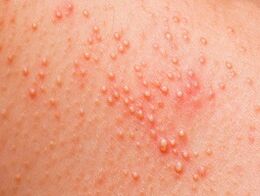Parasites are disease-causing organisms that can live in the human body, animals and even some plants. There are many species in the world that penetrate the host's body, feed on its nutrients, actively reproduce and release waste into the body, which leads to the development of all kinds of diseases.
Worms are most common in humans. These are mainly worms of different lengths and sizes that live in the intestines of the spine. However, some helminths can migrate to other parts of the body by penetrating the muscles, liver, heart, joints, lungs, and even the brain.
Worms harm the host's body, so everyone should know how to detect the presence of parasites in the body. However, many people do not want to go to the hospital, waste time and get tested for helminths for no reason.
In this situation, a person can find out if there are any parasites in the body by focusing on an important criterion, such as the characteristic symptoms that develop with a particular helminthiasis. What will happen if they are not there? It doesn't happen!
However, in the early stages of helminthic warming, the signs of vital activity of foreign microorganisms are poorly expressed or absent. The clinical picture intensifies and manifests itself only when the worms are actively developing, because the larvae can not be parasitized in humans.
How to determine the presence of worms in the body without medical research?

Different types of parasites cause characteristic symptoms in the host. If they are identified and deciphered correctly in time, this will allow the infection to be detected even at an early stage.
Thus, the possibility of misdiagnosis is minimized, which will allow proper and effective deworming using folk or medical antiparasitic substances.
Thus, in order to identify parasites in the human body, it is necessary to pay attention to the symptoms:
- Teeth grind at night.
- Allergic skin rashes - acne, pimples, urticaria, herpes on the lips, eczema, red spots, papillomas, neurodermatitis, psoriasis, etc.
- Typical for diseases of the upper respiratory tract (bronchitis, pneumonia, runny nose), ascariasis and strongyloidiasis.
- Swelling and diarrhea occur because long worms prevent the excretion of bile and pancreatic juice.
- Constipation occurs when worms form a ball that closes the intestinal passage.
- Anxiety in joints and muscles due to parasite migration.
- Severe irritation caused by painful symptoms.
- Persistent dry cough that cannot be treated with standard antitussives.
There is also an increase in body temperature to subfebrile values. Causes of this condition can be allergies, blood intoxication, neurological diseases, dysfunction of internal organs and the brain, and anemia syndrome.

In addition, the worm that lives in a person significantly reduces his immunity, as a result of which the patient often suffers from colds. In addition, the patient has a long depression caused by intoxication of the body.
The typical symptoms of helminthiasis are nausea and vomiting, which are caused by the release of toxins. In addition, certain types of worms can live in the human body, which produces specific hormones that affect the intestinal microflora that cause diarrhea.
However, in some cases, these symptoms are not related to helminthiasis because they are similar to the symptoms of food poisoning. While this can be a serious problem, the later treatment is started, the more time the parasites will cause damage to the organs and systems of the host.
Thus, some kind of test should be performed at home to detect helminthiasis. To do this, you must answer the following questions:
- Does the anus itch at night?
- Swollen lymph nodes?
- Are there any skin rashes?
- How common is insomnia?
- Do you feel vomiting and nausea?
- Do you have muscle and joint pain?
- How advanced is flatulence?
- How much bitterness is in the mouth?
If a person answers these questions seven times, it can be said that his body is most likely infected with worms.
How to determine the type of helminthiasis by symptoms?

At home, you can determine which helminths are in the human body. However, this can be done only when it reaches the active stage of development of parasitosis.
Ascariasis and diphyllobotriasis are the most common neurological symptoms in young patients. Aggressive behavior and increased nervousness are caused by the effects of toxins on the nervous system. An infected person develops migraines and dizziness for similar reasons.
Trichinosis is usually accompanied by swelling of the face and eyelids, along with joint and muscle pain. This is due to the peculiarities of the life of Trichinella, which lives in skeletal muscles. You can get this parasite if you eat thermally processed meat from a wild animal or pork.
Giardiasis affects the liver and kidneys and causes all kinds of allergic reactions. In addition, some people suffer from arthritis, which develops as a result of intoxication when the body is damaged by lamblia. In addition, an invasive patient has weakened immunity, against which the following diseases develop:
- sinusitis;
- stomatitis;
- bacterial vaginosis and more.

A characteristic symptom of pinworm enterobiasis is itching in the anal canal. In addition, most infected people have problems with their digestive system.
Anemia syndrome is characteristic of schistosomiasis. There are also manifestations of dysbiosis (pathogenic microorganisms inhibit the favorable microflora).
The gallbladder is affected by cloniosis, fasciolosis and opisthorchiasis, and icteric syndrome develops. In addition, the liver and spleen grow against the background of these helminthiases.
There are many symptoms of strongyloidiasis. Thus, with its development there are disorders of the gastrointestinal tract, dyspeptic disorders and allergic manifestations.
How to determine whether laboratory eggs exist without laboratory conditions? When worms are in the reproductive stage, it is very easy to find their presence in the body. To do this, you need to perform an analysis for the eggs of parasites.
With the development of opisthorchiasis, you can work alone at home. For this purpose, an adhesive tape or tape should be applied to the skin in the anal area.
It's best to do this immediately after waking up in the morning. If a person has opisthorchiasis, the eggs will be identified on the adhesive surface of the tape.
Laboratory methods for detection of parasites
If a patient has more than three characteristic symptoms of helminthiasis, he should go to a medical facility for laboratory confirmation of the presence of the parasite at home.

When helminthic infestation is suspected, the first step is to examine the stool. This allows you to identify tapeworms, roundworms and liverworts. However, tests should be performed three times in a few days to confirm the diagnosis.
To determine enterobiasis, a shave is performed near the anus. In addition, one of the most accurate and convenient tests for the patient is ELISA, which allows the detection of antibodies produced by the body in the blood while parasitizing pathogenic microorganisms.
Sometimes bioresonance diagnosis is performed by studying the frequency of parasites. This method is very informative because it determines the condition of the body as a whole. In addition to parasites, such research allows us to identify the state of the immune system, other diseases and pathogenic fungi, bacteria and viruses that weaken it.






































